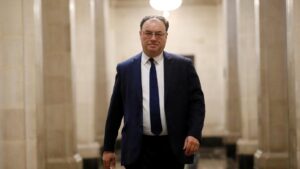Andrew Bailey appeared before a committee of MPs yesterday less than a fortnight after surprising the financial markets by holding interest rates at an historic low of 0.1 per cent.
The Bank of England governor would have been prepared for tough questions from the Treasury committee given the backlash over the decision to hold rates steady despite members of the monetary policy committee having given a series of hawkish speeches before the vote.
Bailey defended the Bank’s decision to MPs and his messaging in the run-up to the decision, but he also addressed a series of other questions about the state of the UK economy.
Appearing with Bailey were Huw Pill, the Bank’s chief economist, who succeeded Andy Haldane in September, and Michael Saunders and Catherine Mann, who are external MPC members. They were questioned on the outlook for inflation and the strength of the jobs market and discussed other themes that will inform the future path of monetary policy.
Labour Market
Bailey said the end of the furlough scheme did not appear to have increased unemployment levels but said it was too early to tell, given the lack of official data from October.
“The anecdotes suggest the transition out of the furlough scheme has not raised unemployment but we don’t really know the full story,” he said. “The OBR forecast has a much larger upturn in unemployment as a result of the end of the furlough scheme than our forecast does. That shows there’s a lot of uncertainty around it in a way.”
Saunders, a former City economist, said he had voted for a rate rise because of the strength of the labour market and wage growth. He dismissed parallels with the inflationary spiral of the 1970s, which was driven by wage increases.
“Talk of a return to the 1970s is completely misplaced. The economy has changed in many ways since then,” Saunders said.
Housing Market
Pill, the Bank’s chief economist, scotched concerns that the housing market is overheating.
He said that rising prices were a factor of ultra-low interest rates and the desire of many consumers to change their lifestyles and move into larger properties outside cities. The stamp duty holiday had also played a role in stimulating the market.
Pill did not believe that the boom in house prices was overdone. The chief economist said real prices relative to incomes were not as high as they were in the “mid-1970s and 1980s”.
Quantitative Easing
Catherine Mann voted against an interest rate rise but was in favour of ending the quantitative easing whereby the Bank creates new money to buy government bonds.
The latest asset purchase programme was put into place a year ago “when conditions really were quite different”, Mann said.
She added that forecasts for inflation were much higher now than they were back then, while growth forecasts had drifted lower.
The unemployment rate was forecast to be higher than it turned out, according to the economist. “It was appropriate at the time but data and conditions change in light of the changed projections,” she said.
“Some private financial market indicators did not incorporate the trajectory for the bank rate.”
The independent MPC member said her overarching aim was to “avoid financial market turbulence”, adding: “To nudge financial market behaviours it would have been appropriate to remove some of the monetary stimulus by terminating the asset purchase programme. It was a balance between the real economy and financial market indicators.”
Climate Change
Bailey said the central bank would “tilt” its own investments towards greener businesses and ventures and would no longer invest in fossil fuels in its corporate bond portfolio.
“It is a policy of incentives,” Bailey said. “Future choices will be incentivised towards firms that are meeting climate targets.”
The Bank is often asked why it does not divest “bad investments”, Bailey explained. “I’m afraid that wouldn’t work because they would end up in the hands of people who just wanted to sweat the assets, as it were.”
Bailey, 62, later added: “A lot more work needs to be done on the macroeconomic [effects] of climate change.” He said the environment was “coming right into the monetary policy horizon” and would feature more on the Bank’s agenda. Some of the recent rises in energy prices could be at least partly attributed to climate change, he said.
























0 Comments